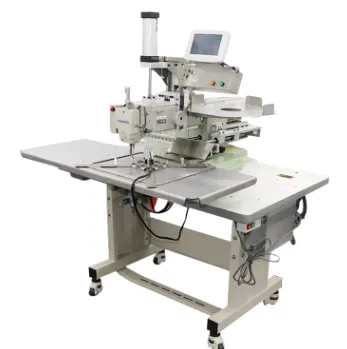Automatic Pattern Sewing Machine: Enhancing Efficiency with Advanced CNC Sewing Solutions
The advent of the automatic pattern sewing machine has brought unparalleled precision and productivity to the textile industry. Central to this advancement is the CNC sewing machine, which automates complex stitching patterns through computer numerical control. Whether for decorative quilting or heavy-duty upholstery, CNC sewing machines streamline manufacturing processes by reducing manual labor and ensuring consistent quality. With options ranging from the industrial CNC sewing machine to specialized CNC quilting machines, manufacturers have versatile tools tailored to their production needs.

Exploring CNC Sewing Machine Features and Benefits
A CNC sewing machine operates by following pre-programmed stitching paths, enabling it to reproduce intricate designs accurately and repeatedly. This technology significantly cuts down production errors and fabric wastage, making it a cost-effective solution for high-volume and custom sewing projects alike. Many models come equipped with user-friendly software interfaces that allow operators to design, modify, and store patterns efficiently.
The industrial CNC sewing machine is designed to handle demanding production environments, capable of sewing thick or layered materials while maintaining speed and stitch quality. For businesses exploring the CNC sewing machine price, it’s important to consider factors such as machine capability, software features, and support services to ensure long-term value.
Specialized CNC Machines for Quilting and Upholstery
The CNC quilting machine specializes in stitching detailed quilt patterns with precision, enhancing both aesthetics and durability of products like bedspreads and mattresses. These machines automate repetitive, complex quilting patterns that would be time-consuming and inconsistent if done manually.
Similarly, the CNC upholstery sewing machine is engineered to work with heavy fabrics and complex contours typical of furniture upholstery. By automating the stitching process, these machines provide consistent seam strength and appearance, critical for high-end furniture manufacturing.
Finding the Right CNC Sewing Machine for Sale
When searching for a CNC sewing machine for sale, it’s essential to assess your specific production requirements, including fabric types, desired stitch complexity, and volume. The right machine will balance automation with flexibility, allowing for both standard and customized patterns. As CNC technology evolves, machines also increasingly support integration with other digital manufacturing systems, further enhancing workflow efficiency.
CNC Stitching: Precision and Consistency in Every Seam
The CNC stitching machine offers the dual advantage of speed and accuracy, making it indispensable in modern textile production. Its ability to replicate patterns flawlessly across multiple units ensures product uniformity and reduces reliance on skilled manual operators. This leads to faster turnaround times and higher throughput without compromising on quality.
In conclusion, automatic pattern sewing machines powered by CNC sewing technology are revolutionizing how textiles are manufactured. From industrial CNC sewing machines built for volume to specialized CNC quilting machines and upholstery machines, these tools provide manufacturers with the precision and efficiency required in today’s competitive markets. Understanding the features, benefits, and pricing of CNC sewing machines will help businesses invest wisely and achieve superior sewing outcomes.
-
Automatic Pattern Sewing Machine: Unlocking New Possibilities with CNC Sewing TechnologyNewsAug.26,2025
-
Automatic Pattern Sewing Machine: Revolutionizing Textile Manufacturing with CNC TechnologyNewsAug.26,2025
-
Lock Stitch Sewing Machine: Precision and Performance in Industrial StitchingNewsAug.26,2025
-
Lock Stitch Sewing Machine: Enhancing Efficiency with Advanced Stitching TechnologyNewsAug.26,2025
-
Lock Stitch Sewing Machine: Advancing Sewing Technology for Industrial ExcellenceNewsAug.26,2025
-
Lock Stitch Sewing Machine: Essential Technology for Precision StitchingNewsAug.26,2025
-
Precision and Durability with Auto Upholstery Sewing MachinesNewsAug.26,2025


























